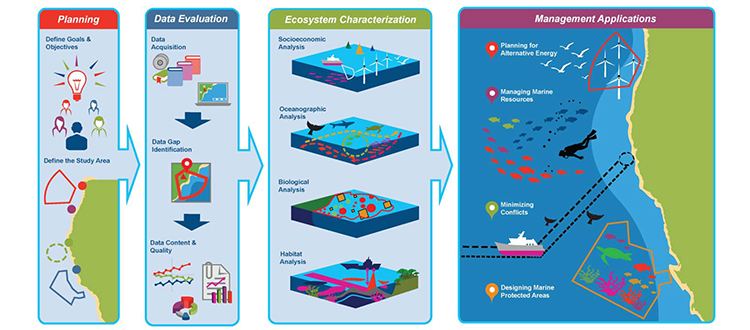
Don't be intimidated by the phrase, Marine Spatial Planning (MSP)! Read the Marine Spatial Planning brochure (La Planification Spatiale Marine) for a succinct description of MSP and its integrated planning at multiple scales. MSP is related to integrated island management which pursues goals such as intact forest ecosystems, intact coastal ecosystems, tourism, coastal protection, fisheries and food security, water securilty and health and more. See Pacific Integrated Island Management: principles, case studies and lessons learned and the Kiribati Integrated Environment Policy.
In general, MSP is an ecosystem-based spatial planning process for analyzing current and anticipated ocean and coastal uses, and identifying areas most suitable for various activities. MSP plans can reduce conflicts among uses, reduce environmental impacts, facilitate compatible uses, and preserve critical ecosystem services to meet economic, environmental, security, and social objectives. In practical terms, MSP provides a public policy process for society to better determine how the ocean and coasts are sustainably used and protected - now and for future generations.
The scope, scale, and content of MSP will be defined by the Pacific Island Countries and Territories and their local entities, to solve problems that the Pacific region cares about in ways that reflect their unique interests, capacity to participate, and ways of doing business. MSP should build on and complement existing programs, partnerships, and initiatives. The intent is to ensure that countries and localities can develop an approach that it determines works best. This approach balances regional and national interests and recognizes that actions commensurate with regional interests and capacities will provide the most immediate regional benefits. Knowledge and experience will build over time and contribute to achieving national objectives. Robust stakeholder engagement and public participation are essential to ensure that actions are based on a full understanding of the range of interests and interactions that occur in the Pacific. Consultation with scientists, technical experts, the business community, and those with traditional knowledge is a foundation of marine planning.












